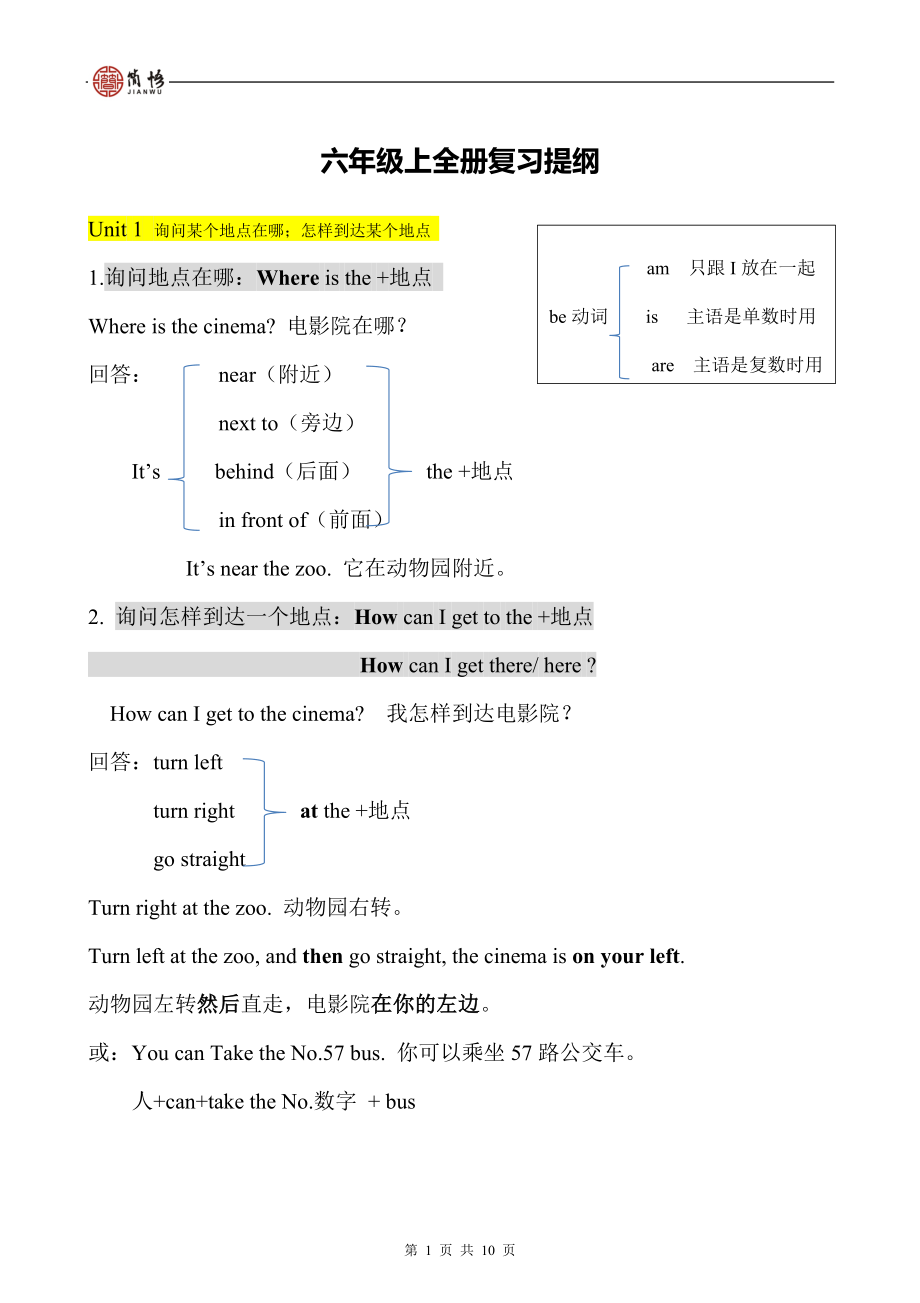《人教版六年級(jí)英語(yǔ)上冊(cè)知識(shí)點(diǎn)匯總總結(jié)提綱.doc》由會(huì)員分享��,可在線閱讀����,更多相關(guān)《人教版六年級(jí)英語(yǔ)上冊(cè)知識(shí)點(diǎn)匯總總結(jié)提綱.doc(10頁(yè)珍藏版)》請(qǐng)?jiān)谘b配圖網(wǎng)上搜索�。
1、 六年級(jí)上全冊(cè)復(fù)習(xí)提綱 am 只跟I放在一起be動(dòng)詞 is 主語(yǔ)是單數(shù)時(shí)用 are 主語(yǔ)是復(fù)數(shù)時(shí)用Unit 1 詢問(wèn)某個(gè)地點(diǎn)在哪�;怎樣到達(dá)某個(gè)地點(diǎn) 1. 詢問(wèn)地點(diǎn)在哪:Where is the +地點(diǎn) Where is the cinema? 電影院在哪�? 回答: near(附近) next to(旁邊) Its behind(后面) the +地點(diǎn) in front of(前面) Its near the zoo. 它在動(dòng)物園附近�����。2. 詢問(wèn)怎樣到達(dá)一個(gè)地點(diǎn):How can I get to the +地點(diǎn) How can I get there/ here ? How can I get
2�����、to the cinema? 我怎樣到達(dá)電影院�����?回答:turn left turn right at the +地點(diǎn) go straight Turn right at the zoo. 動(dòng)物園右轉(zhuǎn)���。Turn left at the zoo, and then go straight, the cinema is on your left. 動(dòng)物園左轉(zhuǎn)然后直走����,電影院在你的左邊����。或:You can Take the No.57 bus. 你可以乘坐57路公交車�����。人+can+take the No.數(shù)字 + busUnit2 到達(dá)某個(gè)地點(diǎn)的交通方式1. How do 某人 go(come) to
3�����、 school ? 某人怎么去(來(lái))學(xué)校 doesHow do you go to school? 你怎么去學(xué)校�?How does she come to school? 她怎么來(lái)學(xué)校的?回答:某人+ go(goes) + to school + by+ 交通工具 come(comes)I go to school on foot. She goes to school by bus.2. 某人+ must + 動(dòng)詞原形 某人必須 People on bikes must wear one. 騎自行車的人必須戴一個(gè)�。 I must pay attention to the traffic li
4、ghts. 我必須注意交通信號(hào)燈�����。Unit3 某人打算做某事1. 某人+be going to +do(動(dòng)詞原形) 某人打算(或?qū)⒁┤プ瞿呈耂he is going to see a film. 她打算去看電影。My uncle is going to take a trip. 我叔叔打算去旅行�。My parents are going to go to the supermarket. 我父母打算去超市。2. 本單元幾大問(wèn)句及答句:1) What+be動(dòng)詞+某人+going to do(+時(shí)間或地點(diǎn))? 某人打算去做什么What are you going to do tomorrow?W
5����、hat is she going to do next week?回答:某人+be going to do(+時(shí)間或地點(diǎn))I am going to go to the supermarket tomorrow.Sarah and Mike are going to take a trip next week.2) When+be動(dòng)詞+某人+going(+地點(diǎn))? 某人打算什么時(shí)候去When are you going (to the cinema)?When are you going (to Beijing)? (地點(diǎn)是城市的名稱�,前面不用the)回答:I am going to the
6、cinema tomorrow. They are going to Nanjing next week.3) Where +be動(dòng)詞+某人+going(+時(shí)間)��?某人打算去哪里Where are you going tomorrow?Where is Sarah going?回答:某人+be going+ to the 地點(diǎn) to Beijing/ to NanjingI am going to the cinema.We are going to the supermarket this morning.4) Who + be 動(dòng)詞+某人+going with? 某人打算和誰(shuí)一起去Who
7����、are you going with?Who is Sarah going with?回答:Im going with my friends. She is going with her sister.Unit4 詢問(wèn)某人愛(ài)好 1.What is +某人的+hobby? 的愛(ài)好是什么��? What are+某人的+hobbies?回答:某人+like(likes)+動(dòng)詞ing1) -What are your bobbies?-I like sing and dancing.2) -What is his hobby? -He likes reading.2. 一般疑問(wèn)句3. Two stude
8��、nts like dancing. One student likes singing.主語(yǔ)是第三人稱單數(shù),動(dòng)詞要加s主語(yǔ):句子開頭表示人的詞動(dòng)詞加s的變化規(guī)則:1. 大部分動(dòng)詞直接加s2. 以 s, x, sh, ch, o結(jié)尾的單詞�,加es3. 輔音字母 + y 結(jié)尾的,把y變i再加es輔音字母:除了a, e, i, o, u 以外的字母4. have變成hasUnit5 詢問(wèn)某人職業(yè)1. What +do 某人+ do? 某人是做什么的�����? What +does 某人+ do?What do you do?What does he do?What does your father do?回
9��、答:某人+be動(dòng)詞+職業(yè)She is a teacher.He is an actor.2. Where do +某人+work? 某人在哪工作�����? Where does+某人+work?Where do you work?Where does your father work?回答:某人+work/ works+地點(diǎn)He works at sea. She works in a hospital.3. How do 某人 go to work? 某人怎么去上班�����? How does 某人 go to work?How do Mike and Sarah go to work?How does y
10��、our uncle go to work?回答:某人+ go/ goes to work+ 交通方式I go to work by car.He goes to work on foot.4. 某人+ want/ wants + to be +職業(yè) 某人想成為I want to be a scientist. 我想成為科學(xué)家��。She wants to be an engineer. 她想成為一名工程師��。Unit6 談?wù)撃橙烁惺?. They are afraid of him. 他們很怕他����。 A be afraid of B A害怕BMy mother is afraid of mouse.
11、我媽媽很怕老鼠�����。Sarah is afraid of mouse. Sarah很怕老鼠����。I am afraid of mouse. 我很怕老鼠�����。2. The cat is angry with them. 貓對(duì)他們很生氣�����。A be angry with B A生B的氣The man is angry with the woman. 這個(gè)男士對(duì)這位女士很生氣。Sarah is angry with Mike. Sarah在生Mike的氣�����。3. -Whats wrong? 怎么了�? -My father is ill. 我爸爸病了。-Whats wrong?-某人+所處的狀況-Whats wron
12���、g? 怎么了��?-I hurt my right hand. 我的右手受傷了��。4. 某人+should+do(動(dòng)詞原形)+其他 某人應(yīng)該He should see a doctor. 他應(yīng)該去看醫(yī)生�。You should wear warm clothes. 你應(yīng)該穿暖和的衣服��。5. Dont be sad. 別傷心Dont be +表示感受的形容詞 別Dont be worried. 別擔(dān)心Dont be afraid. 別害怕語(yǔ)法知識(shí)1.on the left 在左邊 on the right 在右邊2. A is far from B A離B很遠(yuǎn)3. about+某事 關(guān)于 With+某人
13��、 和某一起4. On+星期幾 on Sundayin the morningin the eveningin the afternoonin the weekend 在周末5.用a還是an在以 a, e, i, o, u開頭的單詞前用an, 以其他字母開頭的單詞前用a6. Two students like dancing. One student likes singing.I like singing.He likes reading books.主語(yǔ)是第三人稱單數(shù)�����,動(dòng)詞要加s主語(yǔ):句子開頭表示人的詞動(dòng)詞加s的變化規(guī)則:1) 大部分動(dòng)詞直接加s2) 以 s, x, sh, ch, o結(jié)尾的
14����、單詞��,加es3) 輔音字母 + y 結(jié)尾的���,把y變i再加es輔音字母:除了a, e, i, o, u 以外的字母4) have變成has7. He is playing football. 他正在踢足球。(現(xiàn)在進(jìn)行時(shí)) He is going to play football. 他將要去踢足球���。(一般將來(lái)時(shí))某人+be doing 某人正在做某事 (be是be動(dòng)詞�,doing是動(dòng)詞ing形式)某人+be going to do 某人將要做某事 (be是be動(dòng)詞����,do是動(dòng)詞原形)將be動(dòng)詞和can提到句首,其他照抄注意:I we my You you your 8. 改一般疑問(wèn)句的步驟:找到了沒(méi)
15���、找到在句首加do或does注意:加了does時(shí)����,后面的動(dòng)詞要去掉s找:be動(dòng)詞和canShe is a student. 變成: Is she a student?I can swim. 變成: Can you swim?My father is a scientist. 變成:Is your father a scientist?She lives in China. 變成:Does she live in China?My father goes to work by car. 變成:Does your father go to work by car?9. 將陳述句改成否定句的步驟1��、
16��、找be動(dòng)詞和can找到了則直接在be動(dòng)詞和can后面加notamam not isisnt arearent cancant2�����、 沒(méi)找到在主語(yǔ)后面加dont或doesnt加了doesnt�,后面的動(dòng)詞要去掉s例如:He lives in Australia. 變成:He doesnt live in Australia.10.特殊疑問(wèn)句疑問(wèn)詞意思對(duì)什么提問(wèn)what什么動(dòng)物、植物����、事物、東西who誰(shuí)人whose誰(shuí)的某人的東西where哪里地點(diǎn)when何時(shí)時(shí)間why為什么原因(答句一般以because開頭)how怎么樣方式1) 改特殊疑問(wèn)句的步驟:1���、 根據(jù)劃線部分所表示的含義確定特殊疑問(wèn)詞She
17�、will come back next week. when2���、 將句子中除了劃線部分以外的其他部分變成一般疑問(wèn)句 She will come back 變成:will she come back3���、 將疑問(wèn)詞提到句首When will she come back?注意:1) 若劃線部分就在句首,則不用再把疑問(wèn)詞提到句首了My father is playing football.who變成:Who is playing football.2) 有時(shí)要適當(dāng)加詞 She is washing clothes. doing what變成:What is she doing?第 10 頁(yè) 共 10 頁(yè)
 人教版六年級(jí)英語(yǔ)上冊(cè)知識(shí)點(diǎn)匯總總結(jié)提綱.doc
人教版六年級(jí)英語(yǔ)上冊(cè)知識(shí)點(diǎn)匯總總結(jié)提綱.doc

